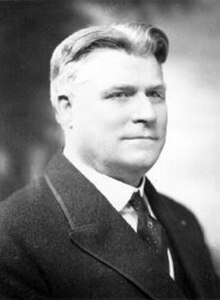Ephraim F. Morgan
Ephraim Franklin Morgan (born January 16, 1869 in Marion County , West Virginia , † January 15, 1950 in Bethesda , Maryland ) was an American politician and from 1921 to 1925 the 16th governor of the state of West Virginia.
Early years and political advancement
Ephraim Morgan came from one of the oldest white settler families in western Virginia . He attended local schools in his homeland and then West Virginia University , where he studied law until 1897. After his admission to the bar, he opened a law firm in Fairmont . He served in a West Virginia unit during the Spanish-American War of 1898. He continued his legal career after the war. He became an attorney for the City of Fairmont and served as a judge in Marion County from 1907 to 1912. Between 1915 and 1920, Morgan was a member of the West Virginia State Public Service Commission . In 1917 he was chairman there. He was a member of the Republican Party and was nominated by it as a candidate for the gubernatorial election of 1920. Since an independent candidate received almost 16 percent of the vote, Morgan reached a 47.3 percent share to prevail against the Democrat Arthur B. Koontz.
West Virginia Governor
After winning the election, Morgan began his new role on March 4, 1921. The focus of his four-year tenure was, in view of the increasing automobile traffic, the expansion of the traffic network in West Virginia, the supply of the veterans and invalids of the First World War and an increase in sales taxes. A commission was put in charge of the plans to rebuild the Charleston Capitol . This burned down shortly before Morgan took office. The west wing of the building was then completed in 1925. During his tenure, too, there were labor unrest in the West Virginia coal mines. The employers and the unions were hostile to each other. The conflict escalated to such an extent that the Governor asked US President Warren G. Harding for military help to restore calm. Then the National Guard was mobilized to prevent further riots.
Another résumé
After his tenure ended on March 4, 1925, Morgan resumed his practice as a lawyer. He worked in this capacity for the US Department of Commerce for six years . In 1940 he ran unsuccessfully for his party's nomination for election to the US Senate . Then he withdrew from politics. He died in Bethesda in 1950. Ephraim Morgan was married to Alma Bennett, with whom he had two children.
literature
- Robert Sobel and John Raimo (Eds.): Biographical Directory of the Governors of the United States, 1789–1978. Volume 1, Meckler Books, Westport, 1978. 4 volumes.
- The National Cyclopaedia of American Biography. Volume 37. James T. White & Company, New York.
Web links
- Ephraim F. Morgan in the database of the National Governors Association (English)
- The governors of West Virginia (English)
Individual evidence
- ↑ Clayton D. Laurie: The United States Army and the Return to Normalcy in Labor Dispute Interventions: The Case of the West Virginia Coal Mine Wars, 1920-1921. In: West Virginia History Journal, Vol. 50 (1991), pp. 1-24 (English).
| personal data | |
|---|---|
| SURNAME | Morgan, Ephraim F. |
| ALTERNATIVE NAMES | Morgan, Ephraim Franklin (full name) |
| BRIEF DESCRIPTION | American politician |
| DATE OF BIRTH | January 16, 1869 |
| PLACE OF BIRTH | Marion County , West Virginia |
| DATE OF DEATH | January 15, 1950 |
| Place of death | Bethesda , Maryland |

